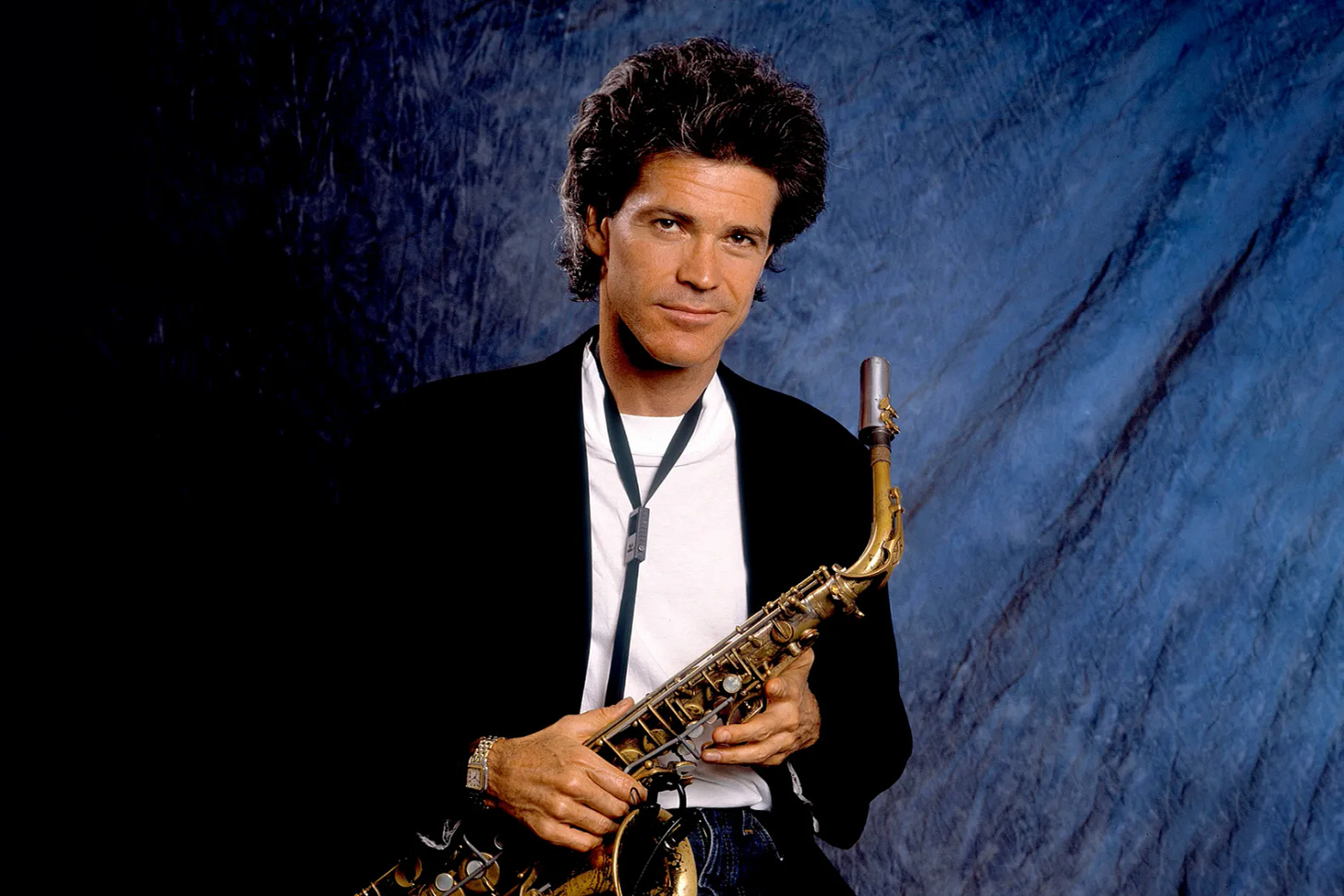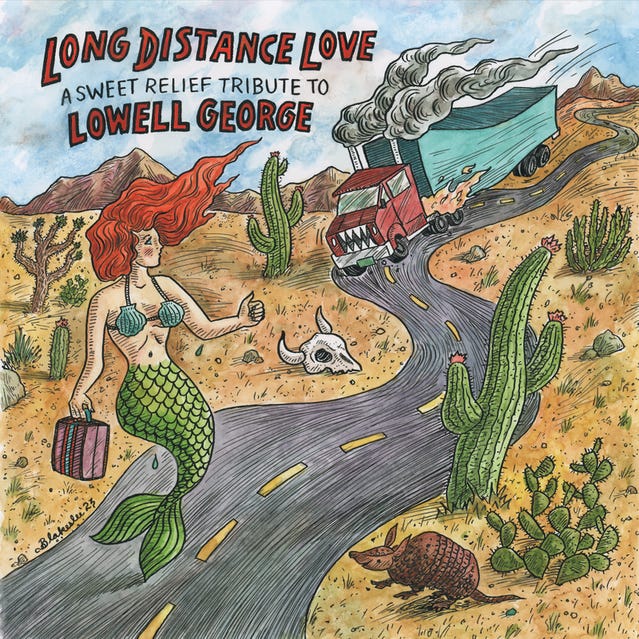Steve Albini and David Sanborn RIP, Albums Pumping On My Stereo
Lemon Twigs go full Eric Carmen, Tributes to Lowell George and Talking Heads, Live Neil Young & Crazy Horse
Steve Albini (1962-2024)
As somebody who is instinctually repelled by edgelord behavior, I didn't seek out the Big Black catalog at what should've been the prime period for my musical exploration—the early 1990s, the thick of the alt-rock explosion that coincided with my time at college—nor did I spend much time with with Shellac upon the release of At Action Park in 1994. There always was more music to hear, plus Steve Albini's recordings were inescapable during the 1990s and beyond, so it wasn't like I was avoiding his work. Year after year, I enjoyed albums where he played an integral role—so many that I soon developed an understanding of his artistic aesthetic even if I generally didn't listen to music he composed. Such was Albini's influence: it was so pervasive that his presence was felt even if your personal taste only occasionally intersected with his projects.
Albini's shadow looms so large that his unexpected death at the age of 61 hit me much harder than I would've expected. Some of this certainly has to do with Albini owning his previous reputation as a provocateur, acknowledging that his anti-social barbs of the past came from an "ignorant position of comfort and privilege are clearly awful and I regret them." He said this in 2021 as part of a Twitter thread that also included the observation: “For myself and many of my peers, we miscalculated. We thought the major battles over equality and inclusiveness had been won, and society would eventually express that, so we were not harming anything with contrarianism, shock, sarcasm or irony.”
That thread, along with appearances as podcasts along with his acumen at poker, helped humanize Albini; he was the rare public figure who benefited from posting on social media. This latter-day acceptance of his own role in "coarsening society" contains a degree of awareness of self and culture that's proving vanishing rare among his generation. I regret we've lost this voice in the public square as much as I mourn the loss of his ongoing work as a recording engineer. Unlike such marquee producers/engineers who seem constitutionally unable to leave their own signature stamp on a recording, Albini's recordings were transparent: they captured the sound of musicians playing in a small room. To me, they always seemed like black & white photographs where the images are so striking, so seemingly authentic, that it's easy to overlook the craft and artistry inherent in the creation. It's only by taking a step back that a shared aesthetic becomes apparent in a body of work. Such is the case with Albini: looking back at his work, it's clear that he prized the sound of live interaction, the chemistry a group of musicians generated. That's always been a characteristic to cherish but it seems especially precious during an age of creeping automation.
David Sanborn (1945-2024)
Like Steve Albini, saxophonist David Sanborn spent his career as a constant, quantifiable presence, popping up at the most unexpected moments on record, television and film. Smooth as a rule, Sanborn never succumbed to unctuousness. His Alto sax often punctured the polish of his surroundings, particularly if he was a hired gun—which he often was in the 1970s, both before and after he launched a career as a leader in 1975. His claim to fame is a star turn on David Bowie's "Young Americans" but he was just as captivating lifting Todd Rundgren's "Zen Archer" into the stratosphere.
Twelve years later, Sanborn's work on the Lethal Weapon soundtrack turned him into something of a celebrity in his own right, even earning him a spot hosting his own variety show. Such kind of exposure runs the risk of turning a musician into an unexpected punchline but unlike other players associated with smooth jazz, Sanborn often circled back to his jazz roots and also retained a tart tonal edge that livened up mellow surroundings and also possessed the wit to run with Ween, lending a hint of malevolence to the supple lounge of "Your Party."
The Lemon Twigs—A Dream is All We Know (2024)
Hellbent on living in the land before punk, the Lemon Twigs have been endorsed by both Todd Rundgren and Big Star's Jody Stephens, a pair of rockers who created power-pop before it became codified with Rickenbackers and skinny ties. A Dream Is All We Know—the duo's fifth album—doesn't bother with any feints toward backbeat: it's all sunshine tunes and cool harmonies, the sound of an endless summer. Despite a clear desire to sound like any Wilson brother, the Lemon Twigs don't sound much like the Beach Boys here. Rather, the brothers D'Addario wind up with a record that plays like the Raspberries who've developed an allergy to their crucial crunch—something sweet and charming that often threatens to blow away to the land of Sid and Marty Krofft theme songs.
Everyone's Getting Involved: A Tribute Album (2024)
Talking Heads are not a band immune to convincing. Way back when Speaking In Tongues was fresh and Stop Making Sense was in its first theatrical run, the Staple Singers honed in on the soul at the heart of "Slippery People," an element Talking Heads themselves accentuated in the performance Jonathan Demme captured for their classic concert film.
Everyone's Getting Involved: A Tribute Album salutes that film by offering new covers of every one of the tunes featured in the film, relying on a cast of indie stalwarts with a few superstars headlining the proceedings in hopes of roping in the curious. It is a diverse roster united by a desire to dig no deeper than the surface. The big names are the worst offenders. The National crawl through "Heaven," Paramore force "Burning Down the House" into a punk straitjacket and Miley Cyrus oversings throughout a disco makeover "Psycho Killer" that robs it of any bite. Cyrus's grandstanding stands in stark contrast to Byrne's affectless deadpan but he's not the Head that's missed most. All the drum loops and stiff rhythms here wind up illustrating just how much Chris Frantz brought to the band; he brought funk to rock and vice versa.
Long Distance Love: A Sweet Relief Tribute to Lowell George (2024)
Unlike Everyone's Getting Involved, Long Distance Love: A Sweet Relief Tribute To Lowell George is a tribute album without a strict unifying aesthetic, swinging wildly between boogie and folk, slick pop and gutbucket blues. Such eclecticism suits Lowell George, the late leader of Little Feat who died at far too young of an age in 1979. Little Feat rallied for an enduring comeback about a decade later—one that's active to this day; they just released Sam's Place, a document of a live gig from 2022—but Long Distance Love keeps the focus directly on George, adding cuts from his solo album Thanks I'll Eat It Here (recently released in an expanded incarnation for Record Store Day) along with Feat classics. At 25 songs, Long Distance Love rambles, sometimes wandering into territory that might be a bit too precious for those who love the funkier side of George and the Feat, yet those moments provide a nice counterpoint to the bluesy bravado of Sugarray Rayford. For my money, the highlights are Inara George singing her fathers tunes (a shimmering "Spanish Moon" and flipping "Teenage Nervous Breakdown" inside out with the bird and the bee), longtime Feat fanatic Elvis Costello singing "Long Distance Love," Sam Morrow conjuring prime '70s Feat funk on "Rocket in My Pocket," Chris Stills with "China White" and Dave Alvin digging into the grit of "A Apolitical Blues."
Neil Young & Crazy Horse—Fuckin' Up (2024; 2023)
A natural companion to 2021's Way Down in the Rust Bucket, which excavated a live performance given right after the release of Ragged Glory, Fuckin' Up finds the reconstituted Crazy Horse rumbling right through all of that 1990 grunge classic. Never the nimblest of outfits, Crazy Horse sounds older and slower here, particularly when compared to the flinty edge they displayed on the Way Down in the Rust Bucket. Then again, they're not opting for defiance this time around: they're offering a communion of noise, reveling in the fact that they can still stumble their way toward transcendence…which they do here on more than one occasion.







